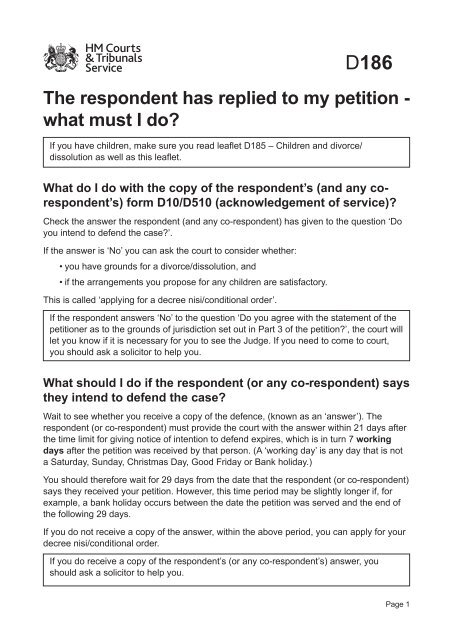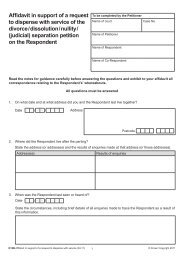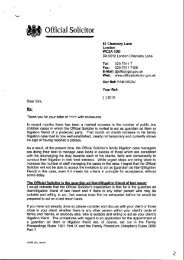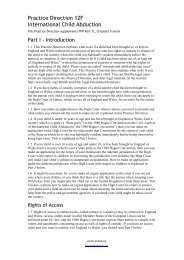D186 - The respondent has replied to my petition ... - Family Law
D186 - The respondent has replied to my petition ... - Family Law
D186 - The respondent has replied to my petition ... - Family Law
You also want an ePaper? Increase the reach of your titles
YUMPU automatically turns print PDFs into web optimized ePapers that Google loves.
<strong>D186</strong><br />
<strong>The</strong> <strong>respondent</strong> <strong>has</strong> <strong>replied</strong> <strong>to</strong> <strong>my</strong> <strong>petition</strong> -<br />
what must I do?<br />
If you have children, make sure you read leaflet D185 – Children and divorce/<br />
dissolution as well as this leaflet.<br />
What do I do with the copy of the <strong>respondent</strong>’s (and any co<strong>respondent</strong>’s)<br />
form D10/D510 (acknowledgement of service)?<br />
Check the answer the <strong>respondent</strong> (and any co-<strong>respondent</strong>) <strong>has</strong> given <strong>to</strong> the question ‘Do<br />
you intend <strong>to</strong> defend the case?’.<br />
If the answer is ‘No’ you can ask the court <strong>to</strong> consider whether:<br />
• you have grounds for a divorce/dissolution, and<br />
• if the arrangements you propose for any children are satisfac<strong>to</strong>ry.<br />
This is called ‘applying for a decree nisi/conditional order’.<br />
If the <strong>respondent</strong> answers ‘No’ <strong>to</strong> the question ‘Do you agree with the statement of the<br />
<strong>petition</strong>er as <strong>to</strong> the grounds of jurisdiction set out in Part 3 of the <strong>petition</strong>?’, the court will<br />
let you know if it is necessary for you <strong>to</strong> see the Judge. If you need <strong>to</strong> come <strong>to</strong> court,<br />
you should ask a solici<strong>to</strong>r <strong>to</strong> help you.<br />
What should I do if the <strong>respondent</strong> (or any co-<strong>respondent</strong>) says<br />
they intend <strong>to</strong> defend the case?<br />
Wait <strong>to</strong> see whether you receive a copy of the defence, (known as an ‘answer’). <strong>The</strong><br />
<strong>respondent</strong> (or co-<strong>respondent</strong>) must provide the court with the answer within 21 days after<br />
the time limit for giving notice of intention <strong>to</strong> defend expires, which is in turn 7 working<br />
days after the <strong>petition</strong> was received by that person. (A ‘working day’ is any day that is not<br />
a Saturday, Sunday, Christmas Day, Good Friday or Bank holiday.)<br />
You should therefore wait for 29 days from the date that the <strong>respondent</strong> (or co-<strong>respondent</strong>)<br />
says they received your <strong>petition</strong>. However, this time period may be slightly longer if, for<br />
example, a bank holiday occurs between the date the <strong>petition</strong> was served and the end of<br />
the following 29 days.<br />
If you do not receive a copy of the answer, within the above period, you can apply for your<br />
decree nisi/conditional order.<br />
If you do receive a copy of the <strong>respondent</strong>’s (or any co-<strong>respondent</strong>’s) answer, you<br />
should ask a solici<strong>to</strong>r <strong>to</strong> help you.<br />
Page 1
<strong>The</strong> court may be able <strong>to</strong> help you calculate the first date on which you may apply for<br />
your decree nisi/conditional order.<br />
How do I apply for a decree nisi/conditional order?<br />
You will need copies of form D84 (application for a decree nisi/conditional order or (judicial)<br />
separation decree/order) and form D80 (affidavit in support) from the court office. <strong>The</strong>y are<br />
free.<br />
When you ask for form D80, make sure you tell the court the grounds for your divorce/<br />
dissolution. <strong>The</strong>re is a different version of form D80 for each of the grounds.<br />
Fill in form D84 and form D80, and send or take them <strong>to</strong> the court office. This is called<br />
‘entering your case in the undefended list’.<br />
You must not return these forms <strong>to</strong> the court until 9 days have passed since the<br />
<strong>respondent</strong> (and any co-<strong>respondent</strong>) say they received your <strong>petition</strong>.<br />
You must answer all the questions on form D80.<br />
What documents will I need <strong>to</strong> exhibit <strong>to</strong> the affidavit?<br />
You must provide documents which show:<br />
• that the <strong>respondent</strong> (and any co-<strong>respondent</strong>) have received the application<br />
• that the <strong>respondent</strong> (and any named co-<strong>respondent</strong>) admit <strong>to</strong> having committed<br />
adultery if this was a ground<br />
• that the <strong>respondent</strong> consents <strong>to</strong> a divorce where the grounds are that you have lived<br />
apart for two years, and<br />
• that the <strong>respondent</strong> agrees with the arrangements proposed for the children.<br />
In almost all cases a copy of the form D10/D510 (acknowledgement of service) filled in<br />
and signed by the <strong>respondent</strong> will show all of these things. <strong>The</strong> form D10/D510 should be<br />
exhibited <strong>to</strong> the affidavit.<br />
What will the court do with the forms D84 and D80?<br />
Court staff will place the papers with your case file and pass it <strong>to</strong> the Judge.<br />
<strong>The</strong> Judge will look at your <strong>petition</strong> and affidavit in support and decide if you can have a<br />
divorce/dissolution. You will not have <strong>to</strong> come <strong>to</strong> court when this is done.<br />
<strong>The</strong> Judge will also consider the arrangements for the children by looking at your form<br />
D8A (statement of arrangements for the children) and the <strong>respondent</strong>’s form D10/D510<br />
(acknowledgement of service).<br />
What will happen if the Judge says I can have a divorce/<br />
dissolution?<br />
<strong>The</strong> court will send you and the <strong>respondent</strong> (and any co-<strong>respondent</strong>) a form D84A<br />
(certificate of entitlement <strong>to</strong> a decree) or D584A (certificate of entitlement <strong>to</strong> an order).<br />
Page 2
Form D84A/D584A will tell you the time and date when the Judge will grant your divorce/<br />
dissolution. This is called ‘pronouncing the decree nisi/conditional order’. <strong>The</strong>re is no need<br />
for you <strong>to</strong> come <strong>to</strong> court on that date. However, if you wish <strong>to</strong> be heard in relation <strong>to</strong> costs<br />
you must serve every party with notice of your intention <strong>to</strong> attend at least two days before<br />
the pronouncement date.<br />
If the Judge is satisfied with the arrangements for the children or if there are no children<br />
of the family, form D84A/D584A will come with form D84B/D584B (notice of satisfaction)<br />
which will confirm this.<br />
A decree nisi/conditional order is the first of two decrees/orders you must have before<br />
you are finally divorced/your civil partnership is finally dissolved and you are free <strong>to</strong><br />
marry/enter in<strong>to</strong> a civil partnership. Leaflet D187 – I have a decree nisi/conditional<br />
order – what must I do next? will tell you how <strong>to</strong> get your decree absolute/final order.<br />
What will happen if the Judge says I cannot have a divorce/<br />
dissolution?<br />
<strong>The</strong> court will send you form D79 (notice of refusal of District Judge’s certificate).<br />
<strong>The</strong> form will tell you why the Judge <strong>has</strong> decided your case is not in order. In most cases,<br />
the court will need further information. You will be <strong>to</strong>ld what extra information is needed.<br />
If the Judge feels your case cannot be decided from the written information supplied, there<br />
may have <strong>to</strong> be a court hearing. This is called ‘removing your case from the undefended<br />
list and entering it in the defended list’. You will have <strong>to</strong> come <strong>to</strong> the hearing. <strong>The</strong> hearing<br />
will take place in court.<br />
If your case is entered in the ‘undefended list’, you should ask a solici<strong>to</strong>r <strong>to</strong> help you.<br />
Leaflet D187 – I have a decree nisi/conditional order – what must I do next? will tell<br />
you how <strong>to</strong> get your decree absolute/final order.<br />
Leaflet D185 – Children and divorce/dissolution will tell you what may happen if the<br />
court says you cannot get a decree absolute/final order until satisfac<strong>to</strong>ry arrangements<br />
are made for the children.<br />
<strong>D186</strong> <strong>The</strong> <strong>respondent</strong> <strong>has</strong> <strong>replied</strong> <strong>to</strong> <strong>my</strong> <strong>petition</strong> (04.11) © Crown Copyright 2011<br />
Page 3






